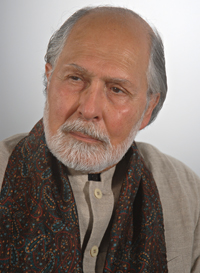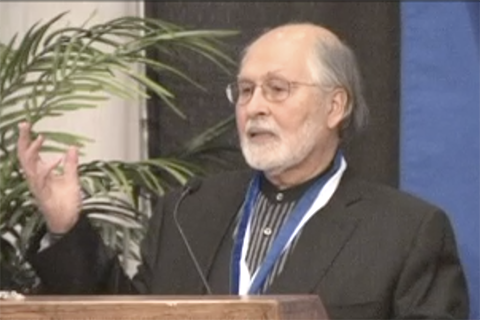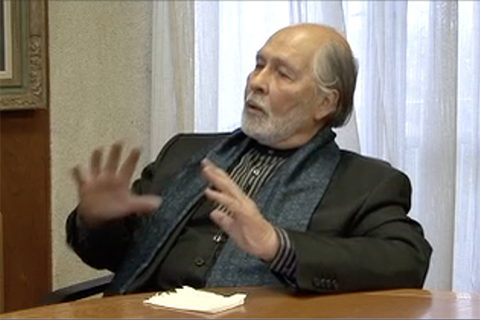Seyyed Hossein Nasr
2010 Recipient
 Professor Seyyed Hossein Nasr, an internationally recognized authority on Islamic science and spirituality, will be awarded Brandeis University's second Joseph B. and Toby Gittler Prize.
Professor Seyyed Hossein Nasr, an internationally recognized authority on Islamic science and spirituality, will be awarded Brandeis University's second Joseph B. and Toby Gittler Prize.
Nasr, who is University Professor of Islamic Studies at George Washington University, will receive the $25,000 prize for outstanding and lasting contributions to racial, ethnic and religious relations on Nov. 30, at which time he will deliver a lecture on "Re-evaluating the Meaning of the Other in Our Lives."
The only Muslim to be included in the Library of Living Philosophers, Nasr is today the greatest living exponent of the philosophia perrenis — the understanding that the fundamental nature of reality is always available and thus knowable by individuals, and that it manifests itself in the religions and wisdom traditions of all cultures and civilizations.
Nasr has served as leader of the Muslim delegation at conferences at which the Pope and the Dalai Lama have represented their faiths. He is the author of more than 50 books and 500 articles, including "Man and Nature: The Spiritual Crisis of Modern Man," "Religion and the Order of Nature" and "Knowledge and the Sacred." Among his influential books on Islam are "Three Muslim Saints," "Science and Civilization in Islam" and "Ideals and Realities of Islam."
Brandeis President Jehuda Reinharz, who headed the selection committee, said: "Professor Nasr's life's work testifies to the personal values and highest scholarly contributions that the Gittler Prize seeks to acknowledge."
Born into a family of distinguished scholars and physicians in Tehran in 1933, Nasr has been concerned since childhood with the nature of physical reality and with the relationship of nature to religious and spiritual life.
His family moved to the United States when he was 12, and he became the first Iranian undergraduate admitted to MIT, with a scholarship in the physics department. Though top-ranked in his class, he began to doubt that physics would lead him to his goal of understanding the nature of physical reality — doubt that was confirmed by contact with British philosopher Bertrand Russell.
Nasr’s discovery of the nature of physics, and what he termed "the overbearing scientific atmosphere" of his department, precipitated a major spiritual and intellectual crisis. He eventually graduated with honors, but long before that had begun searching elsewhere — in philosophy, history, religion and metaphysics — for the answers he was seeking.
He earned a master's degree in geology and geophysics and a doctorate in the history of science and learning at Harvard University. He then returned to Iran to teach at Tehran University, where he became the youngest full professor on the faculty. He was dean of the faculty from 1968-72 and also served as academic vice chancellor.
In 1964, he became the first Aga Khan Professor of Islamic Studies at the American University of Beirut.
Though exiled from Iran since 1979 for political reasons, he remains an important and influential player in the vibrant and diverse Iranian philosophical scene.
Seyyid Hossein Nasr was in residence Nov. 29-30, 2010. The Gittler award presentation and lecture was held Nov. 30, 2010.
Videos
“I am very sad that after all these efforts, after all the films ... and all the talks, and all the earth days, and all that we have said, as soon as a small, or a big, economic crisis comes up the environment becomes irrelevant ... How is it that we are not intelligent enough ... to realize that this is the home we have? ”
Seyyed Hossein Nasr
From his lecture, "Re-evaluating the Meaning of the Other in Our Lives"

